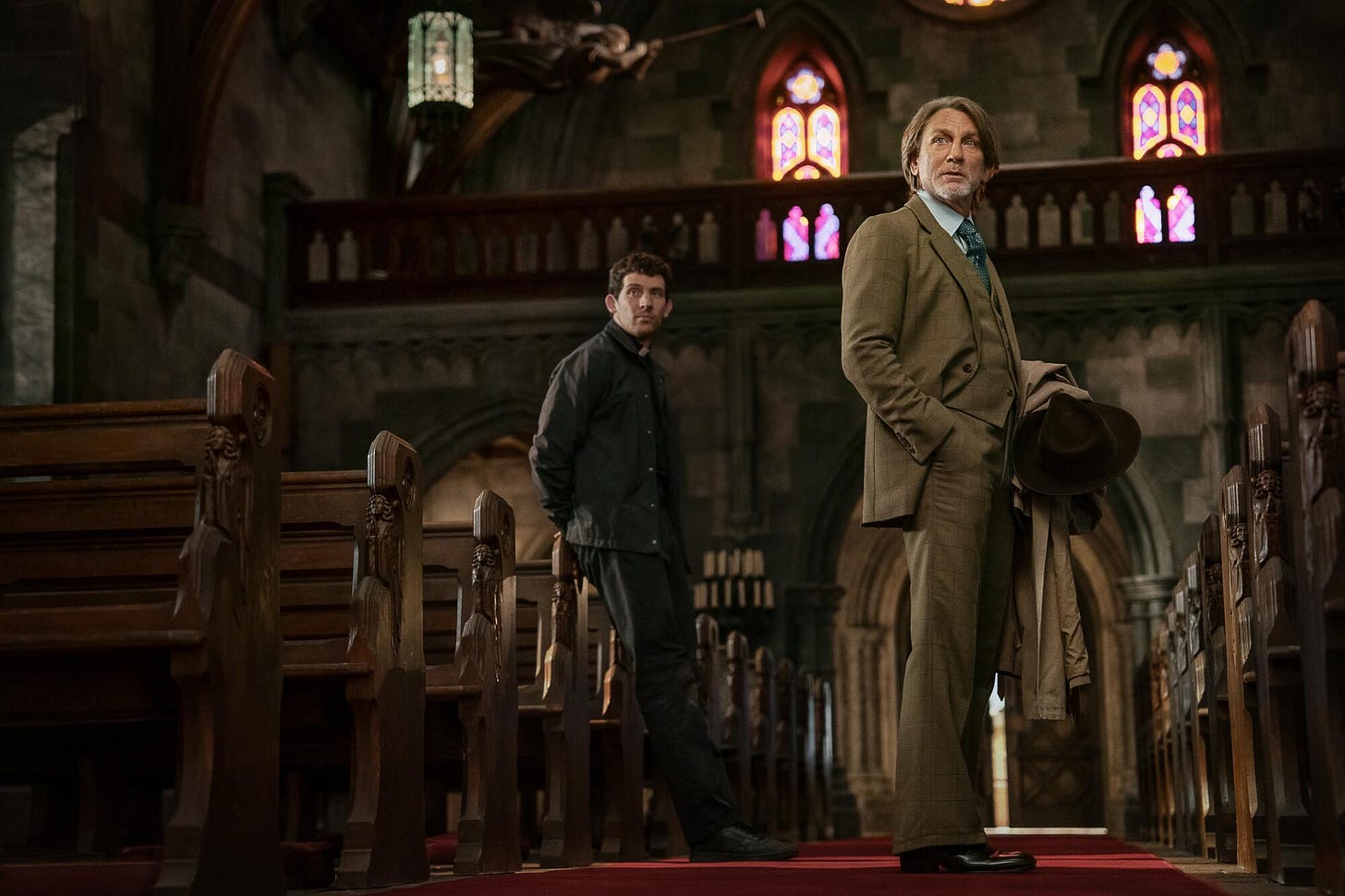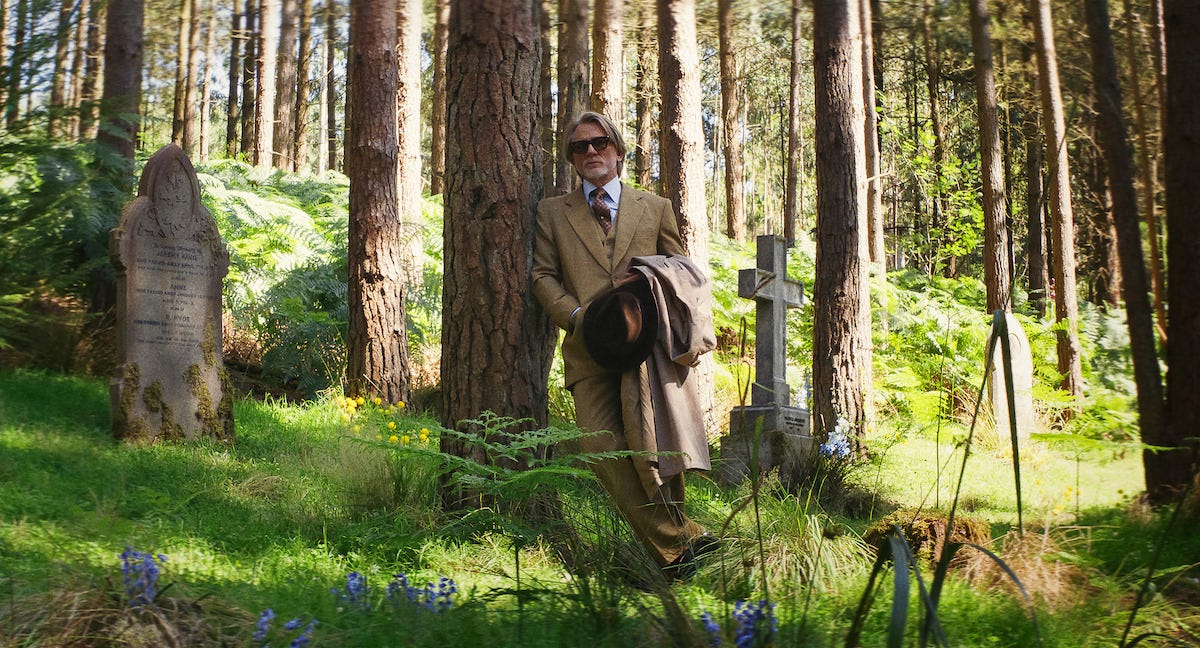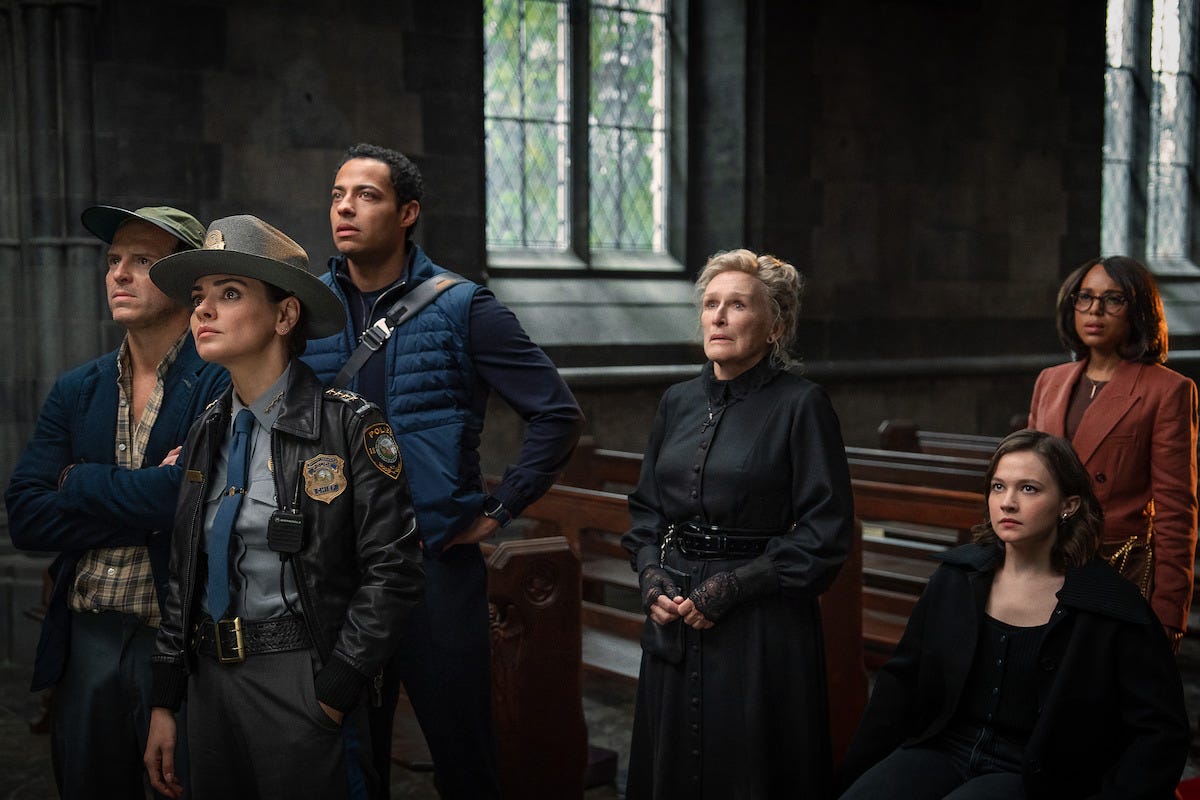Review: "Wake Up Dead Man" finds Benoit Blanc asking the bigger questions
Rian Johnson's latest is a challenging, powerful swerve
There’s this quote Rian Johnson gave in a 2022 interview with Walter Chaw of Film Freak Central around the release of his previous Benoit Blanc film, Glass Onion, that’s been rattling around in my head ever since I read it. I use this quote in my film classes when teaching genre, because it’s such an effective crystallization of the appeal of the ‘Whodunnit,’ and more importantly, of how genres are living, breathing things always inextricably linked to time and culture. Chaw asks Johnson why Knives Out connected with audiences now, and if there are links to previous resurgences of the genre, and Johnson replies:
Well, I mean, you could get lofty about it and talk about how some of the social elements the genre is particularly good at talking about that made it appealing back then are back again. Or you could say that it’s an inherently conservative genre and it’s all about taking a chaotic world and making sense of it. The paternal figure in the detective restoring order … And not that there haven’t been some morally turbulent times throughout the past century, but I do think you could make the case if you wanted to that there’s something specifically broken about us now that was the same kind of specifically broken at the end of the ’70s when those other films were appearing. Morally tumultuous times tumultuous in this way send us back to stories with very clear, defined moral arcs. These films deal with things that are as simplistic as: here’s a big group of terrible people who all have motives to kill, and somebody does it–or maybe all of them do it–and then somebody, thank God, steps in and makes sense of it and detects the lies and pulls those lies out and reveals them, and justice is served at the end. I think right now, especially, accountability probably feels good.
I bet Johnson’s been mulling on that quote for a few years now too, or at least on the ideas it represents; and I imagine he’s been wondering if there’s something missing there, not just in his answer, but in the genre itself. He’s absolutely right about how broken we are, and how much we crave accountability; but he’s made three of these movies now, and the bastard who was President when he made the first one has been re-installed as leader just in time for the third one to land. Accountability would feel good, but yearning for it has gotten us nowhere.
In Wake Up Dead Man, Johnson keeps Benoit Blanc out of the picture for the first 40 minutes, until the absence becomes conspicuous. It’s almost as if he’s fighting against putting The Detective – the person who steps in, makes sense of things, and serves justice – into a world where such a character feels like an increasingly distant fantasy. When Daniel Craig does finally show up, his sing-song southern cartoon drawl cuts through some very literal darkness to such stark effect that, in a crowded theater, you can palpably feel the entire audience start to breathe more freely.1 Few movie characters of the 21st century are more comforting to have around – yet Wake Up Dead Man is consumed, head to toe, with asking what that comfort is actually worth, and if it’s really enough in a world as broken as ours.
This is a darker, slower, and more thematically dense film than Knives Out or Glass Onion. It may be a touch less ‘entertaining’ as a result: less overtly comedic (though there are still some mighty big belly laughs), less oriented around big movie star personalities bouncing off one another (though there are still plenty of fine actors doing outstanding work), and quite literally less ‘colorful’ in its visual palette (though Steve Yedlin’s cinematography is still a tactile wonder to behold). But Wake Up Dead Man is no less enthralling, and its ideas are quite a bit bigger and more challenging. Knives Out and Glass Onion were both very direct in the targets of their satire (wealth inequality and tech billionaires, respectively), but Wake Up Dead Man is more oblique and multivalent. In those Blanc-free first 40 minutes, the film paints a dense and detailed picture of America in microcosm: a bunch of people engaged in a cult of personality, defining themselves through resentment and subtraction, fully aware they are in thrall to a liar, and choosing to justify their vice as virtue. It’s an allegory, but a thorny one, less sardonic or disparaging in its affect than Johnson’s previous films, though no less furious in its sense of moral offense. Perspective is everything, and here, our point-of-view is a young Priest, Father Jud (Josh O’Connor), who doesn’t stand outside this scenario wanting to burn it down, but longs to go inside and fix it. “This is not the true Church,” he tells us in no uncertain terms early on. The bluntness of that sentence took me aback.
Where Knives Out and Glass Onion were commenting on our reality, they also felt like they were taking place in a universe a few degrees off from our axis, in a world where someone like Blanc could meaningfully set things right, at least in the corners of the world he walked through. In Wake Up Dead Man, it feels much more like Blanc has walked out of his world and into ours, a world where his Kentucky-fried charm isn’t enough to fully soothe the spirit, and in which his ability to put the pieces together doesn’t actually do anything to repair the cracks in this society. And this time, he isn’t paired with an underdog outsider (the Ana de Armas or Janelle Monáe roles), but with another figure of moral authority in O’Connor’s Father Jud. The Detective teams up with The Priest, literally and archetypally, and by putting Blanc in conversation with religion, Johnson also questions the very limits of the Whodunnit genre in the here and now.
Religion has had a role in the Whodunnit before, of course; these are, at their core, stories of sinners being led into the light by learned, moral men. Agatha Christie’s books are not overtly Christian, but when devout believer David Suchet wanted to plumb deeper into Hercule Poirot’s faith in his TV adaptations, it’s not as though the stories had to be rewritten from the ground up. Johnson, likely the world’s foremost expert on the entire genre at this point, is of course aware of that, and Wake Up Dead Man is in conversation with any and all religious subtext, intentional or otherwise, that has ever existed in this narrative form. What he posits through the course of this story is genuinely thought provoking: that the role of The Detective and the role of The Priest are actually quite different from one another. In one of the most moving scenes of Johnson’s filmography, Father Jud’s obsession with helping Blanc break the case melts away as he realizes why a woman on the other end of the phone won’t give him the crucial clue: because her mother is dying, she’s in an emotional and spiritual crisis, and what she needs from a Reverand in that moment is vastly different than Benoit Blanc’s dogged pursuit of ‘justice.’ The Detective’s job is, indeed, to go out and fix the world: to walk into a scenario bent askew by amorality, and through revealing the truth, bend it all back into place. But The Priest’s role, Jud realizes, is to take the world as it is, and help those inside it navigate the world as it presents itself, for good or for ill.
I don’t know Rian Johnson, but I’d guess that his perspective on all this is closest to Benoit Blanc’s, which is to say a sort of liberal atheism: respectful of other people’s faiths, and maybe even curious to learn more, but not at all a believer himself. Yet like all great writers and storytellers, Johnson is able, and eager, to look outside his own mind, and here, he’s crafted the rare Hollywood film that examines faith without dealing in absolutes. It’s not preaching dogma, but neither is it belittling the value organized faith can provide. It’s a film about religion, from a non-religious perspective, that affirms the fundamental human goodness of searching for truth, whatever that means and wherever that leads us. Those who genuinely want to understand themselves and their fellows better are, ultimately, brothers in purpose, whatever tradition they come from; and those who seek to sew division, to bury truth and make the world hazier until those caught in their orbit start hating themselves and their neighbors – well, those people are the real enemies, and they come from a lot of different backgrounds too.
Here’s something I don’t talk about much: my father was a Lutheran pastor, as was his father before him. The only reason I exist is because my Uncle, an Episcopalian priest, introduced his sister to my father at a religious function, and they hit it off. Like it or not, religion is in my blood. I have a somewhat tortured relationship with it; I’ve seen organized religion profoundly hurt people I love, and some of the best and most moral role models in my life came from religious backgrounds. I have boundless contempt for monsters like our current President and Vice President, who cloak themselves in ‘Christianity’ while working every second of every day in brutal contrast to the words of Christ; and I know that this particular hypocrisy cuts me so viscerally because somewhere deep inside myself, there is a very real sense of fellowship with the beliefs they profane.
Do I believe in God? I don’t know. Maybe. Maybe not. I know the older I get, the more appallingly hubristic it feels to me to declare such things with any sense of certainty. And I will admit that these last ten years of American history have made me increasingly inclined to yearn for a divine moral arbiter: a force that can tell right from wrong even when our present-day society proves itself incapable of doing so. I want to believe in a God right now for the same reason I want to watch stories with Benoit Blanc in them: so that I can see someone smarter and more morally upstanding than I am step in and start putting things right.
Wake Up Dead Man prompts these kinds of reflections. It is built to both leave one surer of one’s moral convictions and less confident in the frameworks through which one interprets reality. The Detective and The Priest do, indeed, have separate tasks, but those tasks are ultimately complementary. The film’s extended finale is less about piecing the plot together than it is about synthesizing these positions. Blanc even allows himself to be interrupted – divinely or otherwise – in the middle of his climactic Christie-esque monologue, recognizing there is something of higher value here than expositing the crime. The Priest and The Detective – or The Faithful and The Skeptic, we might say – find themselves needing one another to each do their jobs – guiding sinners towards truth – to the fullest extent. The cleverness isn’t what awes us this time around; it’s the meeting of the minds, the humility exhibited by both Blanc and Jud in each providing what the other one lacks, that leaves us surprised.
Wake Up Dead Man is less overtly ‘finger on the pulse’ than either Knives Out or Glass Onion were, but I would argue its prescience cuts even deeper. Those films come from places of great moral certitude, and understandably so: their targets were rich conservatives in the era of Trump’s first presidency, and the alarming rise of idiotic techno-fascists during the Biden administration. Wake Up Dead Man was probably written well before the second Trump presidency got under way, but it feels exactly right for this time of even greater evil, deeper uncertainty, and a more nihilistic social malaise creeping in around every corner, conditions which make the path out of this quagmire feel more nebulous and distant than it was even five or ten years ago. This time, Blanc doesn’t walk away having put the world back together, but having helped it find the tools to start rebuilding. In a time where messages of hope can often feel naïve, Wake Up Dead Man arrives at a conclusion that’s genuinely inspiring: Look for the truth. Look for the truth in whatever way you can. Look for the truth in ways that make you uncomfortable. If you find unlikely allies in that search, that’s probably a sign you’re doing it right. No one path or perspective will get us out of this. Hold tight to what you know is right: it’s the only way out of the darkness.
But also, Daniel Craig croons the words “Scooby Dooby Doo” at one point is his wonderful Foghorn Leghorn voice, and that might just be all the proof I need of God in this lifetime.
Read the book 200 Reviews by Jonathan R. Lack in Paperback or on Kindle
Subscribe to PURELY ACADEMIC, our monthly variety podcast about movies, video games, TV, and more
Like anime? Listen to the podcast I host with Sean Chapman, JAPANIMATION STATION, where we review all sorts of anime every week. Watch on YouTube or Subscribe wherever you get your podcasts.
This is one of many reasons I extend a hearty Fuck You to Netflix for their continued strategy of releasing great movies in a tiny number of theaters before stranding them forever on their crappy streaming platform. Stop it.




